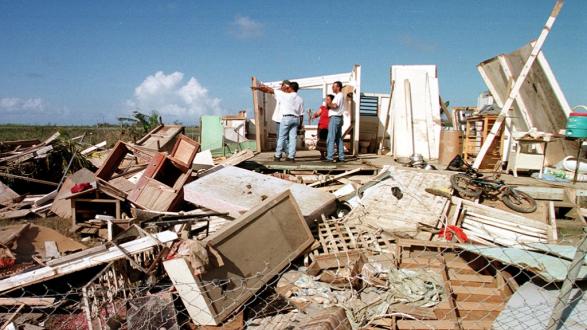In:
Global Beat is your weekly stop for news from around the world. Join us every Friday morning for important stories you should know about.
This week, Puerto Rico copes with devastating damage from Hurricane Maria; Iraqi Kurds vote overwhelmingly in favor of independence; Angela Merkel is reelected as German chancellor while Alternative für Deutschland enters parliament; and more.
____________________
Americas
A week after Hurricane Maria ravaged Puerto Rico, millions of residents are still without fuel, water, or sufficient food, and 97 percent of the island’s population is still without electricity. The lack of fuel and electricity has endangered patients at hospitals, which are relying on fuel generators, and water shortages have forced people to fill up at local springs, rivers, and wells. San Juan Mayor Carmen Yulín Cruz told reporters that the situation in Puerto Rico is "life or death" and constitutes a "humanitarian crisis." The Trump administration announced that it will waive the Jones Act for 10 days, which restricts foreign ships from delivering supplies to Puerto Rico. However, Puerto Ricans will be required to pay full price for transportation off the island. Donate to hurricane relief organizations here.
Also check out:
Central & South Asia
Uzbekistan and Kyrgyzstan announced their commitment to increasing trade turnover between the two countries. Kyrgyz Economy Minister Artem Novikov and Uzbek Foreign Trade Minister Eler Ganiev met in Tashkent this week to discuss practical steps their countries can take going forward, including holding a joint Kyrgyz-Uzbek business forum and an exhibition of commodity producers during Kyrgyz President Almazbek Atambayev’s upcoming state visit to Uzbekistan. The Diplomat writes that the "warming of relations between Uzbekistan and Kyrgyzstan is just one example of a remarkable change in Tashkent’s tone, toward its neighbors most especially."
Also check out:
- Afghanistan becomes key topic in India’s talks with United States, Russia – The Economic Times
China & East Asia
North Korea threatened to shoot down U.S. warplanes outside of North Korean airspace on Monday after suggesting that President Trump’s comments at the UN last week constituted a "declaration of war." In response, President Trump doubled down, insisting that he is "totally prepared" to take "devastating" military action should it be necessary. Meanwhile, an Ohio coroner announced that Otto Warmbier, the 22-year-old American student who was imprisoned in North Korea for 17 months, died from "lack of oxygen and blood to the brain."
Also check out:
- Shinzō Abe dissolves Japan’s parliament ahead of snap elections – Foreign Policy
Europe & Russia
Angela Merkel won a fourth term as German Chancellor on Sunday, but gains for the far-right party Alternative für Deutschland, which won about 13 percent of the vote—tripling its 2013 numbers—cast a shadow on her victory and signaled that nationalist populism is still strong in Europe. The election results mean that Merkel’s party will be forced to build a coalition with opponents, limiting her ability to champion major European initiatives. Read more about the far-reaching implications of the German election here.
Also check out:
Middle East & North Africa
Iraqi Kurds voted overwhelmingly in favor of independence in a referendum held this week, with 92 percent of the voters of the Kurdistan region voting for secession from Iraq. The vote has been opposed by the Iraqi government and most of the international community, and Iraqi Prime Minister Haider al-Abadi has been steadfast in his determination to "impose Iraq’s rule in all districts of the region with the force of the constitution." On Wednesday, Iraq’s parliament requested that al-Abadi send troops into a disputed area controlled by Kurdish forces.
Also check out:
- Why Saudi women driving is a small step forward, not a great one – The New Yorker
Southeast Asia & Oceania
Scientists are warning of the global threat posed by the spread of drug-resistant "super malaria" throughout Southeast Asia, which emerged in Cambodia and has since reached Thailand, Laos, and southern Vietnam. There is worry in the medical community that millions could be at risk if the disease, which is carried by mosquitos, spreads to Africa, where 92 percent of all malaria cases occur. The strain of Plasmodium falciparum is resistant to the anti-malarial drug artemisinin.
Also check out:
Sub-Saharan Africa
Chad’s inclusion on the newest iteration of President Trump’s travel ban has baffled experts and threatens to strain relations between the two countries, with officials stating confusion over how the country "achieved this lack of trust from the United States" and arguing that the move "seriously undermines the image of Chad." The ban, which is indefinite, goes into effect October 18. Trump’s presidential proclamation stated that Chad has failed to "adequately share public-safety and terrorism-related information," that "several terrorist groups are active within Chad or in the surrounding region, including elements of Boko Haram, ISIL-West Africa, and al Qaeda in the Islamic Maghreb," and that there is a "significant terrorism-related risk from this country." Analysts pointed out that Chad has been a counterterrorism ally of the United States for several years.
Also check out:
- Angola gets new president after 38 years, but its outgoing leader and his family still cling to power – Los Angeles Times




